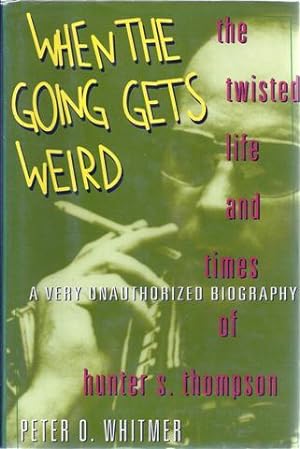Synopsis
A look at the life and lunacy of the well-known journalist traces the people and events that shaped Thompson's life, describing his troubled Kentucky childhood, his life in New York City in the 1950s, his encounters with Kesey and others, and his writing.
Reviews
Whitmer ( Aquarius Revisited ) weighs in here with the third in the recent spate of unsuccessful unauthorized biographies of legendary gonzo journalist Thompson. Though Whitmer can write stylishly--"Thompson was a rock star trapped in the mind of a journalist"--he sketches his subject's life and work with little depth. Whitmer interviewed Thompson in 1983 for the Saturday Review , but his recollection of him offers less insight than bizarre detail: Thompson drank Bloody Marys with a side of coffee. Moreover, Whitmer lacks the sources of E. Jean Carroll's oddly annoying The Strange and Savage Life of Hunter S. Thompson (Nonfiction Forecasts, Dec. 14, 1992). He did not speak to Ralph Steadman, Thompson's illustrator sidekick, whose tale of a trip to cover a heavyweight title fight in Zaire is the highlight of Paul Perry's otherwise undistinguished Fear and Loathing: The Strange and Terrible Saga of Hunter S. Thompson (Nonfiction Forecasts, Nov. 16, 1992). Were these three books mixmastered and then joined together to make one Thompson biography, readers would be better served. Photos not seen by PW.
Copyright 1993 Reed Business Information, Inc.
The third in a recent spate of unauthorized biographies of outlaw journalist Hunter Thompson, this is hands-down the best-- most balanced in its assessment of both the writer and his era, and better written and more deeply researched than either Paul Perry's Fear and Loathing or Jean E. Carroll's Hunter (both 1992). All three biographies are anecdote-driven and inevitably repeat the stories that have become part of Thompson's legend: his wild teen years in Louisville, full of dangerous pranks and endless boozing; his stint in the Air Force, where he began his imaginative journalism: and his hedonistic years in N.Y.C. and Big Sur, where he attempted to equal his novelist-heroes--Fitzgerald, Hemingway, and J.P. Donleavy. After a decadent period in Latin America, freelancing for the now-defunct National Observer, Thompson made a splash with an article about the Hell's Angels, which he expanded into his first bestselling book. A student of anarchist cults, Thompson created plenty of disorder on his own even as he perfected his participatory style of ``gonzo'' journalism. Despite his own herculean drug abuse, Thompson was critical of the Sixties early on, seeing the dark side of flower power and hippie pacifism. Just as he became a character in the funny papers during the Seventies- -as Gary Trudeau's ``Uncle Duke''--the real Thompson began his decline, with one witness calling him a ``babbling idiot.'' Too much cocaine has hastened his descent into paranoid weirdness, with little good writing to show for it. Whitmer is the first demythologizer among the biographers, which is why he's the first to mention Thompson's distended liver and the messiness of his divorce. Despite some factual errors--Frank Mankiewicz is Herman's son, not Joe's--Whitmer is the most reliable of Thompson biographers. His book reads so fluently it almost compensates for Thompson's lousy recent work. (Eight pages of b&w photographs) -- Copyright ©1993, Kirkus Associates, LP. All rights reserved.
Because the 1960s lifestyle has become an item of fascination for many Americans, it seems fitting that Hunter S. Thompson, one of its symbols, has become the subject of several new biographies (E. Jean Carroll's Hunter: The Strange and Savage Life of Hunter S. Thompson , previewed in Prepub Alert, LJ 10/15/92, and Paul Perry's Fear and Loathing: The Strange and Terrible Saga of Hunter S. Thompson , Thunder's Mouth, 1993). Whitmer, author of Aquarius Revisited ( LJ 7/87), has produced an unvarnished picture of a self-destructive writer at work and at "play." Fueled by alcohol and drugs, Thompson's raw, angry style of writing came to be called "gonzo" journalism. Writing of politicians from Richard Nixon to Bill Clinton and events from Vietnam to the Kentucky Derby, Thompson has covered the American scene for a number of newspapers and magazines, but he is most closely associated with Rolling Stone. In many ways, this is a sad story of a creative person who wasted much of his talent. Recommended for biography and popular culture collections.
- Rebecca Wondriska, Trinity Coll. Lib., Hartford, Ct.
Copyright 1993 Reed Business Information, Inc.
"About this title" may belong to another edition of this title.
